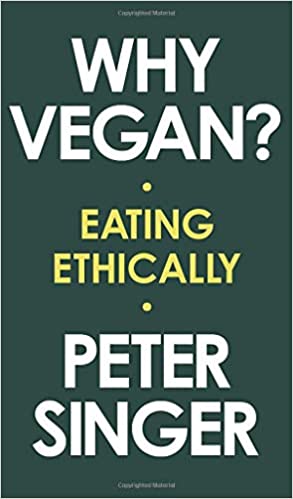Why Vegan?
Full Title: Why Vegan?: Eating Ethically
Author / Editor: Peter Singer
Publisher: Liveright, 2020
Review © Metapsychology Vol. 25, No. 42
Reviewer: John D. Mullen
In the U.S., philosophers (unlike economists, physicists, medical researchers, etc.) rarely make their way into public consciousness. This is true even of philosophers whose work has had wide influence upon how everyday North Americans think and act. Peter Singer, an Australian who has spent most of his career at Princeton University, is a good example of this.
While there have always been individuals and groups dedicated to the protection of non-human animals, the victims in question tended to be cats, dogs, horses or chimps, favorites of human animals. And the protests tended to be motivated by feelings of sympathy. But it’s one thing to feel sorry for the horses in Central Park, pulling carriages as temperatures reach 96 F, it’s another to be able to reason-out the protest, and then to extend the implications of that to other situations. Peter Singer’s 1975 book Animal Liberation, up-ended the bias toward animals we identify with and extended his criticisms, with cogent reasoning, to everyday practices that we simply took for granted. Just as Thomas Jefferson (following John Locke’s Second Treatise on Government, 1691) provided a philosophical foundation for an uprising against the English king, and Karl Marx provided a philosophical rationale for Socialism, so Singer’s work provided the same for the (non-human) animal rights movement.
In his approach to deciding what is ethically good and bad, Singer is a philosophical Utilitarian. This means, put simply, that in distinguishing the ethical from unethical he emphasizes the importance of creating happiness (broadly defined) and avoiding or minimizing suffering. This differs from Locke and Jefferson, who begin with a set of “unalienable” human (though not non-human animals) rights; “life, liberty and the pursuit of happiness” (life, liberty and property for John Locke) which are to be respected, not violated.
Note how we human animals tend, linguistically to disavow our animality. We speak as though we are not animals. We speak, for example, of human rights vs. animal rights, with the millions of nonhuman species lumped into one bucket. It’s like comparing the maximum velocity of a baseball to the maximum velocity of a ball.
Human history is filled with tales of masters and slaves; patricians and plebians, lords and serfs. In each case the group members are either benefitted or exploited based upon some feature each has or does not have; malehood, white skin, money, royal ancestors, etc. Many now look back at these harsh and discriminative practices with disdain or perhaps embarrassment, e.g., the woman’s place is in the home (a precept my own father accepted without questioning and which his three daughters thoroughly ignored). Nowadays we find no feature of womanhood that justifies being subject to men (with exceptions dubiously based upon religious traditions). Singer notes that these cases; gender chauvinism, racism, religious bias, etc. that have been widely rejected, all take place within the human species of animals. But what are we to say about the analogous distinction between human animals vs. other species of animals? What aspects of the human animal justifies the horrors inflicted by the human animal upon other animal species (in Singer’s case to harvest food for our tables)?
Singer is a clear, cogent writer. The brief chapters of this brief, 83 page, book are taken from previous Singer essays with additional comments. I recommend it very highly.
John Mullen is a retired professor of philosophy and an author of fiction and non-fiction. He lives, writes and works upon his timber frame house, in Dresden, Maine. His 2017 novel, The Woman Who Hated Philosophers is published by Swallow Tail Press.
Categories: Ethics
Keywords: food, ethics, veganism

